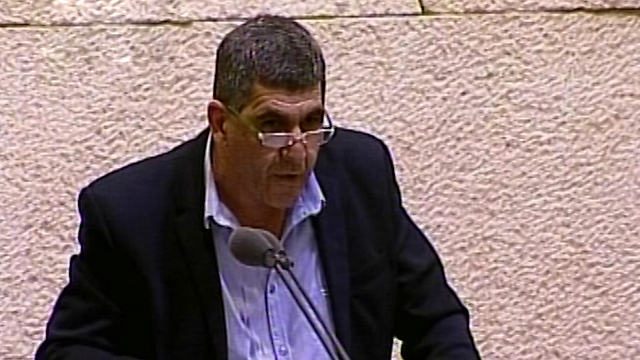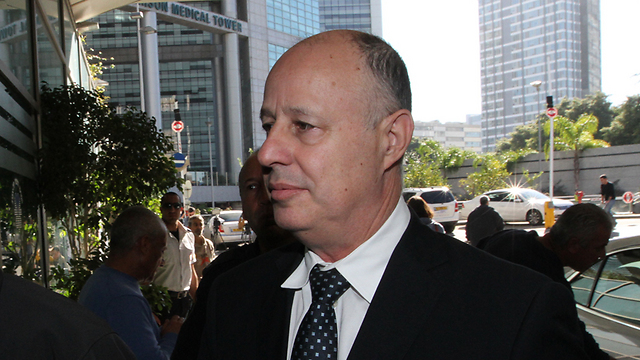
Deri back to the scene of the crime
Op-ed: What led Aryeh Deri to return to the Interior Ministry - an uncontrollable urge or simple politics? And how does his appointment relate to Netanyahu's internal-party headache?
Some this week wondered why does he need this. Deri has traveled a long way before he was appointed a minister again. The return to the Interior Ministry, from which he was evicted when facing bribery charges, could destabilize everything he's accomplished and raise a public outcry, as well as spark court petitions in opposition to it.
Deri himself is aware of this, and has specifically given interviews saying he did not intend on returning there. But it seems like the urge to return to what may seem like the crime scene is too strong. The urge to repair the damage in the most troublesome place for him.
A senior political official came up with a different explanation for Deri's return. "What are his options," he asked. "Deri can't remain the 'minister of the periphery.' The head of a party in the coalition who is also a member of the security cabinet can't only be minister of the development of the Negev and Galilee. The only reason he didn't take the role when the government was established is because the ministry was stripped of certain planning powers, and Deri didn't want to give more power to (Finance Minister) Moshe Kahlon. But after already being economy minister, where can Deri go?"
Despite statements by State Attorney Shai Nitzan on the problematic nature of Deri's return to the Interior Ministry, it doesn't look like his new position is in danger. He has a High Court of Justice verdict that allows him to serve as a minister, and an official legal opinion by the attorney general that says he can serve as interior minister.
He could have returned to the Economy Ministry after the natural gas plan was approved by the government (Deri opposed certain parts of the plan which is why he resigned from the position of economy minister -ed). There are those who thought that's what he would do. But Deri wanted to move on, to a ministerial position that was probably his real desire – whether he would admit it or not.
The nerve of some MKs
But Deri's return to the Interior Ministry raised another, much more dramatic issue, something that's actually worthy of being the subject of street protests, and that's the status of Deputy Minister Yaron Mazuz (Likud).It's hard to estimate just how much nerve and callousness Knesset members who were just recently elected (and even that, one must note, by accident) can display. The only reason people like Mazuz and MK Oren Hazan became MKs is because no one believed the Likud party would win 30 seats in the 2015 elections, and thus there were very few people vying for those spots in the primaries.

But lo and behold, the "back row sitters," as they're called, won't stop generating controversy ever since they arrived in the Knesset, and demanding higher-ranking roles than those of simple MKs.
Yaron Mazuz is a good example: When Deri was appointed interior minister this week, he asked for Deputy Minister Mazuz to be replaced by MK Meshulam Nahari of Shas, who had been deputy welfare and social services minister up to that point. Nahari had a bad time, since Welfare Minister Haim Katz (Likud) has relinquished virtually no powers to him. Deri wanted to give him some reprieve.
But then, a problem came up regarding Mazuz. He was told that he would be appointed as a minister in the Prime Minister's Office, but Mazuz did his homework and found out that the PMO didn't have much to offer him. There's just nothing there. The last one to hang around the place, trying to find authority over something, was Minister Gila Gamliel.
Before taking over the Ministry of Social Equality, Gamliel gave Netanyahu a list of all the powers it should have: Authority over youth, minorities, the "computer for every child" project. Instead of the Senior Citizens' Ministry that was offered to her, she built a respectable ministry of her own, which emptied out the PMO almost completely. After Minister of Immigration and Absorption Ze'ev Elkin (who is also the minister of Jerusalem affairs and heritage) took several other authorities for himself, Mazuz was simply left with nothing.
Perhaps if he was closer to the prime minister, or was known as someone who gets things done, he would have found something to do. But since Mazuz is neither, he'll probably do what most deputy ministers do: Pass his time lazily while wasting taxpayer money.
Mazuz understood this well, and did what the freshmen MKs have learned to do – disappear. Due to the fact that the coalition government is based on a single seat majority (61 MKs vs. the opposition's 59), there's nothing more worrisome than the 61st MK being absent. When the Knesset prepared to swear-in Deputy Ministers Mazuz and Nahari, it turned out Mazuz wasn't even there.

Later, when he realized his protest couldn't last much longer, Mazuz issued a statement saying his absence was due to him holding an emotional farewell event with the Interior Ministry workers, the same ministry in which he's been about as active as a potted plant for the past six months.
And so, while Interior Ministry workers were sobbing on Mazuz's shoulders, the coalition was feverish over his absence. They were in the midst of calculating things with his absent vote in mind, but then Mazuz appeared and the coalition breathed easy again.
Netanyahu's inter-party headache
But that's just the preview of what's expected to happen in the Knesset in the coming weeks. The first thing Netanyahu will have to do is appoint a coalition leader to replace MK Tzachi Hanegbi, who is set to become a minister. Three MKs are vying for the job: David Bitan, Miki Zohar, and Yoav Kish. Bitan has seniority, but he's not easily controlled nor is he predictable, and has a habit of clashing with others. Kish has clashed with ultra-Orthodox MKs over enlistment issues, and Zohar has a shaky public image following his proposed Shabbat bill to force all business owners to close for the weekend.

When a Coalition chairman is appointed, other roles will have to be dealt with such as the head of the Knesset's House Committee and the head of the Knesset's Foreign Affairs and Defense Committee. The House Committee is a sensitive junction of parliamentary management. The Foreign Affairs and Defense Committee will see at least two MKs going for the chairmanship: MK Avi Dichter and MK Kish. If MK Benny Begin isn't appointed as a minister, he might want the job as well.
It seems Netanyahu is ruing the day he sent Danny Danon to the UN. He thought he got rid of one problem, but he created ten others: He got Haim Katz as a Likud party leader who was much more combative than Danon, and he needs to handle appointments.
If there's something Netanyahu hopes for now, it's that Bennett and Kahlon save him and refuse to accept the appointment of two more Likud ministers. No one is disputing Hanegbi's appointment, but the second minister is expected to be Netanyahu's next big headache. The list of people who want the job is long, from Ayoob Kara to David Bitan. Every brick Netanyahu moves threatens the integrity of the entire structure. He needs to beg Kahlon and Bennett to not let on. Or perhaps he should bring back the primaries so that everyone gets off his case. After this week's shameful display, it doesn't seem impossible.











